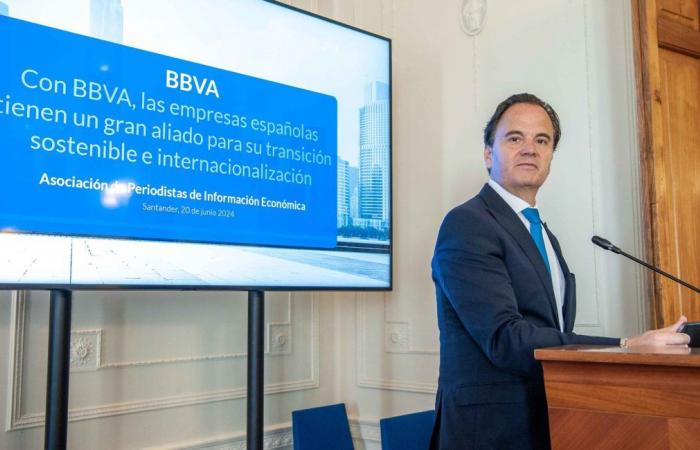
“We have to help Spanish SMEs to internationalize all over the world. Significant investments are also required in knowledge and only banks that have a certain scale they can afford, something that BBVA’s international presence can offer,” he said. “Banks with an international presence in corporate and investment banking have a unique advantage to be able to serve SMEs in Spain and help them in their internationalization and decarbonization,” he explained.
BBVA’s global head of Sustainability and CIB has highlighted the global presence and cross-border business model of the bank, something that, in its opinion, facilitates the access of its business and SME clients to the main markets. With a presence in 15 of the 20 largest global economies, we make it easy for our clients to take advantage of the economic corridors between Asia, Europe, Latin America and Mexico-United States. This global approach allows us to support the energy transition and take advantage of investment opportunities, he said.
The ‘cleantech’ opportunity
“In Europe alone, the European Commission estimates a Necessary investment of 92,000 million euros in ‘cleantech’ between 2023 and 2030. Taking into account public investment and current private investment leads us to a estimated investment gap of 50 billion eurosaccording to Cleantech for Europe”, stressed Javier Rodríguez Soler.
Consider that “Spain is in a privileged position to take advantage of this wave of investments and become the European hub of new clean technologies or ‘cleantech’, thereby leading the decarbonization process.”
Spain, with its abundance of natural resources, lower energy costs and a competitive standardized energy cost [LCOE, por sus siglas en inglés] in solar and wind energy, is in an ideal position to lead this process, he added.
“It is estimated that, By 2030, more than 150,000 jobs can be generated in Spain if we manage to take advantage of this opportunity thanks to the development of renewable energies and energy efficiency“said Javier Rodríguez Soler, according to the ‘Industry and Energy Transition Hub’ report and analysis by McKinsey.
Javier Rodríguez Soler recalled the recent launch of BBVA’s global initiative to support the development of new ‘cleantech’. And he has detailed the four technologies that will be focused on: hydrogen and biofuels; Energy storage; mobility; and carbon capture technologies. “To achieve this, we have organized a specialized team distributed between the United States, the United Kingdom and Spain, with the aim of offering our clients financing and advice on these technologies,” he said.
The bank has actively participated in several Project Finance operations in ‘cleantech’which Rodríguez Soler has listed:
- H2 Green Steel: First ecological steel plant based on hydrogen.
- Envision: Development of a 9 GW Gigafactory in the north of France.
- Ricarica: Development of a national network of 2,900 electric vehicle charging points in Italy.
- Nova Power Bank: 680 MW/2270 MWh energy storage project in California, USA
Javier Rodríguez Soler has referred to the decarbonization objectives in his credit portfolio, for which he has defined sectoral indicators. The bank has recently expanded its intermediate emissions reduction targets for 2030 to two new sectors: the real estate sector in Spain and aluminum globally. These are added to the list of objectives in eight emissions-intensive sectors previously set by the financial institution (oil and gas; electricity generation; automobiles; steel; cement; coal; aviation and maritime transport).
Furthermore, he has pointed out the crucial role of financial entities as intermediaries in the revitalization of the economy and the sustainable transition. For investments in decarbonization to materialize, “it is essential that governments create an enabling environmentproviding certainty in climate and sectoral regulation, guaranteeing adequate incentives, facilitating rapid permits and advancing the implementation of carbon pricing policies,” he concluded.





